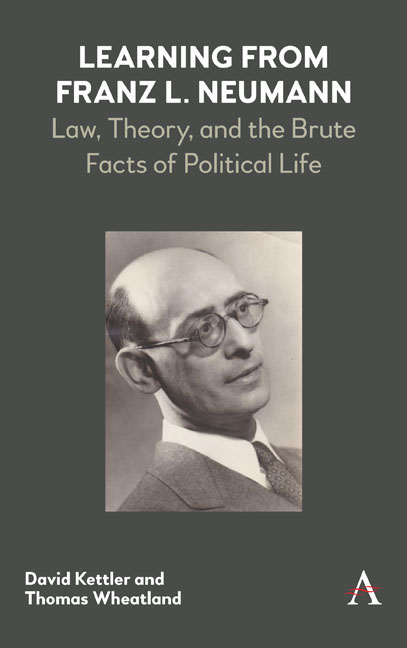Book contents
- Frontmatter
- Contents
- Chapter 1 The Challenge of Franz L. Neumann
- Chapter 2 Social Constitution, Social Power and Responsibility: Neumann and Labor Advocacy
- Chapter 3 Power, Resistance and Constitutions
- Chapter 4 Franz Neumann's Commemoration of Exile
- Chapter 5 After Weimar: The First Exile
- Chapter 6 Neumann's Second Exile: Negotiating the Politics of Research
- Chapter 7 No Happy End: Unprofitable Negotiations
- Chapter 8 Behemoth: Wars Can Be Lost
- Chapter 9 Franz Neumann in Washington: The Political Intellectual at War
- Chapter 10 Franz Neumann in the University: La guerre est finie
- Chapter 11 The Legacy: Four Studies
- Conclusion
- Index
Chapter 7 - No Happy End: Unprofitable Negotiations
Published online by Cambridge University Press: 06 September 2019
- Frontmatter
- Contents
- Chapter 1 The Challenge of Franz L. Neumann
- Chapter 2 Social Constitution, Social Power and Responsibility: Neumann and Labor Advocacy
- Chapter 3 Power, Resistance and Constitutions
- Chapter 4 Franz Neumann's Commemoration of Exile
- Chapter 5 After Weimar: The First Exile
- Chapter 6 Neumann's Second Exile: Negotiating the Politics of Research
- Chapter 7 No Happy End: Unprofitable Negotiations
- Chapter 8 Behemoth: Wars Can Be Lost
- Chapter 9 Franz Neumann in Washington: The Political Intellectual at War
- Chapter 10 Franz Neumann in the University: La guerre est finie
- Chapter 11 The Legacy: Four Studies
- Conclusion
- Index
Summary
Anti- Fascism in America: Paul Tillich's 1938 Theses
Franz Neumann's need to gain a measure of recognition in his exceptional and exceptionally demanding American locale of exile— especially in view of the barriers to much of America that were the price of the opportunities offered by Horkheimer's Institute of Social Research— to earn a livelihood for himself and his family, to assemble sufficient bargaining power to solidify and to renegotiate his deal and yet also to pursue his own political and intellectual designs— made for a time of strain and difficulty. This is documented in the record of his own work during the six years between his arrival in New York and his departure for Washington as well as in the internal records of the Institute. In an important sense, however, Neumann's characterization of himself as a “political intellectual” captures the continuities amid the diversions, distractions and duties that absorbed so much of his energy. And the conjoint missions of understanding, explaining and resisting the Hitler regime in Germany remained at the center. And there was never enough, if only because he was never satisfied with being a member of a team. He felt a distinctly personal responsibility as theorist, analyst and advocate.
The central questions for him were political, not philosophical, jurisprudential or social scientific, as such, although the question of what was to count as political, both in subject matter and practical engagement, involved those fields of inquiry. We have little evidence of Neumann's active engagement in the political efforts of the inwardly divided exile groupings after his arrival in New York, and what little we have is predictably ambiguous, as to the extent to which he was acting primarily as agent for the Institute. The best- documented instance turns on a set of theses on “the political and spiritual tasks of the German emigration” circulated by Paul Tillich in 1938 among representative exile intellectuals, ranging from Thomas Mann to leading figures at the New School. Although it was Max Horkheimer who was on the distribution list, it was Neumann who suggested some changes to Tillich, in his own name, and he also evidently prepared points for discussion at the Institute, as did Herbert Marcuse.
Information
- Type
- Chapter
- Information
- Learning from Franz L. NeumannLaw, Theory, and the Brute Facts of Political Life, pp. 231 - 248Publisher: Anthem PressPrint publication year: 2019
